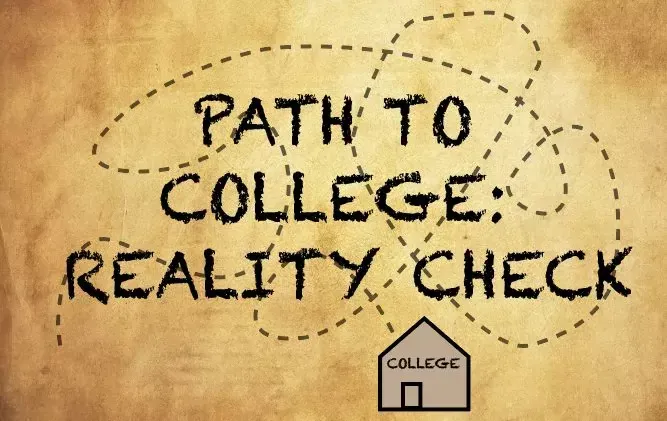Gen Z: Carrying the Weight of the World
Shelly Humbach • March 13, 2020

Gen Z
is the newest generation to be named and were born between 1995 and 2015. They are currently between four and 24 years of age with the US population approaching 74 million. The high school students I work with are a part of Gen Z, as is my youngest child and I confess, I am fascinated with this demographic. As an Independent Educational Consultant, I sometimes feel conflicted as to post-secondary choices for high school graduates. After all, the purpose of my work is to guide students and (mostly middle-class) families through the college search and application process. But college is not the right choice for everyone, just as blue hair is not the right choice for everyone. High school students need to be teenagers and explore, test the waters, have fun, screw up. But Gen Z really doesn’t have that luxury. They are so over scheduled with the never-ending list of actions deemed necessary to get into college, that they simply don’t have time to just be and the consequences are significant. Gen Z is emotionally and physically exhausted.
My youngest daughter lives and studies in Europe and as such I am somewhat familiar with the European approach to the age-old question of what’s next, after high school. The contrast between how Americans and Europeans view post-secondary options is profound. In Europe, students finish secondary school (equivalent to US high school) and then most often, they gap a year, or two. During this time, they work, mature, gain experience and clarity on what they like and don’t like and what they are good at and not. Then, based on their recently gained knowledge, if Uni is appropriate, they attend. The vast majority of European undergraduate, bachelor’s degree programs are achieved in three years, often with an option for a masters in four. No, gen ed courses, just straight into their field of study. If the student determines that their immediate life path does not mandate a degree from Uni, they opt for a different one. Trade school, vocational school, tech school, with little, if any, cultural stigma for this choice. Further, in Europe, most Unis are “created equal”, that is, they are there to provide an education and students attend based on the courses offered, proximity to home and affordability. Prestige is not coveted. Practicality is the point.
Of course, in the United States, we have a very different higher education model, one that allows students to explore, test the waters, figure out what they like and then pursue that major. That four-year degree is what Gen Z is pushed toward with mounting pressure that this is the only path. For many, the alternate path of vocational or tech school is looked down upon. And when it comes to four-year schools, Americans are obsessed with prestige and name-brand. Parents are more than willing to (somehow) spend $75,000 per year for their child (ren) to attend Columbia, MIT, or Stanford. Knowing that these schools are extreme reach schools for most does nothing to remotely deter or quash the obsession with being admitted. In fact, the impossible odds of being admitted fuel the frenzy. I am often asked if the education at these highly selective institutions is worth it. Is it worth it to spend $300,000 for an undergraduate degree? I can’t answer that question as the answer is unique to each family and without judgment, I support them and their choices. My job is to provide current and relevant information and data to help them make an informed decision and then guide them through the process.
Whether students go on to a four-year college, begin working, or enroll in plumbing school, I appreciate and respect each unique choice.
I desperately wish that American society would support, appreciate and respect the departure from the traditional four-year experience. Students have varying needs, wants and abilities and need support, regardless of the path they choose. And while we’re at it, can we let go of the obsession with schools that virtually no one can get into? Many parents actually believe that the sole road to success and wealth is through these pearly gates. To say I disagree is quite an understatement. It matters far less where
a student studies than it does what she accomplishes
during her studies. Need more on that, read, The New York Times Bestseller, Where You Go Is Not Who You’ll Be: An Antidote to the College Admissions Mania,
by Frank Bruni. And if you are a young person and your parent(s) are aiming you toward one of the dozens of colleges and universities that admit less than 15% of their applicants, how must that feel? Stress much? And parents, think back to your teen-aged years. Could you have weathered this nearly unattainable expectation and ridiculous pressure to perform?
One thing I know for sure is that Gen Z is crumbling under the pressure of “what’s next?” Ask just about any high school student how much of their chosen course work stems from interest in a class versus what they are being told they have to take in order to be a successful college candidate. I often hear from parents that they need my help because applying to college today is nothing like it was back when they went. Truer words have never been spoken. They can’t begin to make sense of the variety of application platforms, the varying deadlines (what the h*** is Restricted Early Action?), she has to write how many essays? He has to interview? Is the interview evaluative or informational? She needs a Student Activity Record? Yeah, you’re right, applying to college today looks nothing like it did, even 15 years ago. Additionally, when it comes to procedure, no two schools do much, if anything, the same way. Like everything else in our culture, college admissions is competitive and increasingly complex. But the biggest problem is the pressure society puts on Gen Z to get into college. And that mandates straight A’s, varsity athletics, launching a recycling start-up, fluency in a second or third language, and leading the youth worship team. Make no mistake, children, from an early age are pushed toward the end goal of college. I recently listened to a podcast by a Gen Z expert, who also happens to be a Certified Educational Planner, like me. He spoke of kindergartners, from a private school in New York who are being introduced to the idea of college and essentially, the importance of thinking about that, when they are five. His webinar is fascinating and invaluable. Let that sink in. I don’t know about you, but when I was in kindergarten, I was just trying to get away with sticking my tongue out at Sally Jacobs and apart from lunch, really only thought about recess.
What are we asking our kids to endure? And for what? What can we do to regain perspective? I implore every parent of Gen Z to take a step back and try to appreciate what these kids are experiencing. They are fearful of lack of resources, both financial (thanks, 2008 recession) and environmental (where do I begin?). They are growing up in a culture of gun violence that is having lasting, traumatic effects on their psyche (my daughter experienced a school-shooting, so I have the right to make this statement). And to top it all off, they are being raised with a hyper awareness that they must attend a four-year college, to the tune of a minimum of $100,000. Seem heavy? You bet it is. I implore every parent of a Gen Z kid to check in with what matters and take an active, assertive step toward shutting out the harmful one-upping chatter. You’re the adult. You know what chatter I’m talking about. And if you don’t, pick up Dr. Jean Twenge’s book, IGen: Why Today’s Super Connected Kids Are Growing Up Less Rebellious, More Tolerant, Less Happy—and Completely Unprepared for Adulthood—And What the Means for the Rest of Us.
Or watch this TedxDayton, by Dr. Corey Seemiller, Gen Z: Making a Difference Their Way.
Gen Z is different and progressive, just like every generation that has come before. The world continues to evolve as does humanity and as adults, it is essential that we make a concerted effort to support our young people, particularly in light of the unique and powerful obstacles facing Gen Z.

Sophomore year is the quiet workhorse of high school. It’s not flashy like junior year. It’s not celebratory like senior year. But it matters. A lot. Here’s your tight, no-nonsense checklist: Academic Rigor Check Is your student appropriately challenged? Honors? AP? IB? Dual enrollment? Colleges care about trajectory. Upward trends = good. Coasting = not so much. Grades This is a foundational transcript year. No “we’ll fix it later” energy. Strong sophomore grades make junior year pressure more manageable. Testing Plan (Light, Strategic) Consider a practice SAT/ACT in the Spring. No need to prep - you are looking for a baseline. Diagnostic only. Meaningful Activities Random clubs and sporadic community service? Hard pass. Encourage commitment, leadership, and genuine interest. Colleges want to see depth, not breadth. Summer Game Plan Catch up on sleep, hang out with your friends…….and one or two of: camps, jobs, volunteering, academic programs, internships, and job shadowing. Summer is for fun and also for showing curiosity or initiative. Relationship Building Teachers matter. Not for favors. For mentorship. Strong junior-year recommendations start with authentic sophomore engagement. Early College Exposure Casual visits. A local campus tour. Virtual info sessions. Start noticing size, setting, vibe. You’re gathering data, not making decisions. Financial Reality Check Run Net Price Calculators. Yes, now. Sticker shock is real. Know your numbers early to inform a great fit college list, and also so senior year isn’t a panic spiral. Executive Function Audit Time management. Organization. Study habits. If there are cracks, identify and work on them before junior year hits like a freight train. Mental Health Ambition is great. Burnout is not. Balance matters. Always. Sophomore year is about positioning. Quiet, strategic positioning. No drama. No frenzy. Just smart moves that compound over time. You’ve got this. And maybe put junior year on your vision board, cause it’s coming.

FINANCIAL FIT (a.k.a. Don’t Wreck Your Retirement) ☐ Have an honest family conversation about maximum annual college spend ☐ Run the college website Net Price Calculator for at least 5–8 schools ☐ Complete FAFSA prep (FSA IDs created for student + 1 parent) ☐ Separate dream schools from financially realistic schools ☐ Often sticker price ≠ net price COLLEGE LIST STRATEGY ☐ Confirm your student’s GPA/test scores in context of each school ☐ Build a balanced list: likely / target / reach / wildcard (no more than 10) ☐ Check which schools are test-optional vs test-preferred vs test-required ☐ Remove any school that makes zero financial sense (yes, even that one) CAMPUS VISITS (WORK SMART, NOT CUTE) ☐ Schedule official tours and ask about sitting in on a class ☐ Preview virtual tours before visiting ☐ Meet the regional admissions rep ☐ Visit or email the Financial Aid Office - Ask: “Based on our profile, what’s a realistic net cost?” TESTING (STRATEGY OVER PANIC) ☐ Decide SAT/ACT plan early (spring = ideal) ☐ Compare scores to each school’s middle 50% ☐ Submit scores only if they strengthen the application ☐ Support stress management - not score obsession TIMELINE & MOMENTUM ☐ Summer after junior year = essay drafting season (Godspeed) ☐ Create a senior-year application calendar ☐ Track deadlines: EA / ED / RD / Scholarships ☐ Keep senior-year grades strong (yes, colleges still care) PARENT REMINDERS (READ THIS TWICE) ☐ This is your student’s journey - guide, don’t micromanage ☐ Comparison is poison (especially with other parents). THIS. ☐ Prestige does not equal happiness, success, or ROI ☐ A financially sane college choice is a win

Juniors (and parents), take a breath. The college search can feel like trying to pick a favorite show on Netflix with 4,000 options and no remote. It’s overwhelming, and without a plan, nothing happens except mild panic and procrastination. Here’s how to cut through the noise: 1. Start close to home. Visit a small, medium, and large college in your state — even if none of them are on your actual list. You’re gathering data, not declaring allegiance. Pay attention to the basics: campus vibe, feeling of safety, surrounding town. Not every school sits in a picture-perfect bubble. (Looking at you, USC area.) Understanding what size and setting feel right is the foundation for building a meaningful college list. 2. Turn travel into opportunity. Heading out of town for Spring Break or a long weekend? Add a campus or two to the itinerary. You may think you’d never go to college in that region, but campus visits have a way of changing minds, or reinforcing them. Also, test the travel logistics. If getting from home to campus feels like planning a Mars mission, that’s worth knowing. 3. Make each visit count. Sign up for the official tour. But if you can skip the info session, do it. They’re often more marketing than substance, and the biggest takeaway is usually a free pen. Instead, ask Admissions if you can sit in on a class, tour the department you’re actually interested in, or talk with a professor. That’s where you get the real story. A bachelor’s degree is a major investment both financially and personally. Treat the process for what it is: a thoughtful evaluation of your options. The campus visit remains one of the most valuable tools you have. Use it intentionally, and you’ll make smarter choices with far less stress and a fantastic outcome.

College Application Season, a/k/a Application Hell, is upon us. Every year, my Colorado kids are pushed to meet the Colorado Free Application Days, which typically are in early October. This early deadline is both a blessing and a curse. Let me explain. The curse is that it’s early, and the pressure to complete applications and essays is intense. The blessing is that it’s early, which requires students to get their act together and finish their applications and essays. This dichotomy mirrors my experience working with teens. It is, you guessed it, both a blessing and a curse. Now, I realize I am being over-generalistic, but bear with me. The blessings are innumerable: they are bright, funny, kind, compassionate, and very, very aware. Of all kinds of stuff. Gen Z is fascinating in that they have the emotional intelligence of, say, a 45-year-old mother of three. They are informed and driven to act to impact injustices, locally and globally. And bonus! They can handle any of your persnickety tech issues without blinking an eye. Gen Z restores my faith in humanity, and for that, I am deeply grateful. And the curse? They cannot write. By the grace of God, each year, I have a handful of students who can write brilliantly, beautifully. But every year, that handful gets smaller, and along with that so does my faith in humanity. I firmly believe and bear witness to the fact that readers make writers. This is true for me. It is true for my children, and it’s just true. The rant? Devices and social media (I know, I am a broken record) are the culprit. Gen Z is growing up in a world of clickbait communication and constant distraction, fueled by addictive algorithms. The result - many have the attention span of a gnat. NO ONE IS READING ANYMORE. I don’t mean a headline. I mean a full article, let alone a book. Remember those? As a mother of three adults, functioning children, and a professional who has worked with hundreds of teens, please take heed. Read to your kids. Invite your kids to read to you. Their future depends on it.

In June, I hosted my annual Senior Essay Writing Workshop. This was the first in-person workshop since 2019. I bet you can guess why. I was elated to meet my students face-to-face after months, even years, of connecting through the screen. Imagine my surprise at their height, super-smiles, and warm laughter. Dang, it was wonderful. So, essentially, all my in-state seniors gather at my house for a three-hour intensive workshop on crafting a killer college essay. As I was preparing for the event, it occurred to me that I might be in competition with their PHONE. Classic directness (this is probably a character flaw) led me to inform my students and their parents, in advance, that this would be a no-phone gathering. My messaging went something like this, Important: Phones are placed in a basket at the door and retrieved at noon. No exceptions. Parents: If you need to reach your student during the workshop, text me directly at **********. Now, I am fully on board with the phone-free movement. I support it, advocate for it, and live it (I brilliantly quit all personal media last November). And I thought: my event, my rules. I was a little concerned about how this announcement would land. Turns out my concern was mainly about the parents. The kids? Not so much. In fact, research indicates that students crave phone-free learning environments. Suffice to say, the workshop was a smashing success. Not a single student pushed back against the policy. One poor soul forgot to retrieve her phone and left it sitting all alone in the basket. Not to worry, though. She didn’t get far before turning back to grab it. Here’s the truth: We don’t have to bow down to every technological whim or societal pressure. As adults, we know the phone is a problem, and it’s our job to foster healthy, happy individuals. So let's keep this momentum going. As Maya Angelou wisely said, “When you know better, do better.”

I work with incredible colleagues; collaborative, smart and supportive. They make me better and I am deeply grateful. Every year, Jennie Kent and Jeff Levy of Big J Educational Consulting share invaluable information regarding college admissions. Their research is impeccable and accurate and provides crucial data to help students and families make informed college decisions. Read on, share broadly and give a shout out to these generous professionals! Early Decision and Regular Decision Acceptance Rates Class of 2028 Domestic Undergraduate Need-Based and Merit Aid Class of 2028 In-State and Out-of-State Acceptance Rates Class of 2028 Financial Aid for International Noncitizens Class of 2028 International Noncitizens Acceptance Rate and Yield Class of 2028 Percentage of Students Submitting SAT and ACT Scores Class of 2028 Athletic Divisions and Conferences (partial list) Class of 2028 - NEW! These charts are visual, interactive, and easy to use. They make it possible to instantly sort using any column's metrics and to easily compare subsets of colleges. They are free and can be accessed at www.bigjeducationalconsulting.com/resources . From Jennie and Jeff: We hope you find these resources helpful in your work guiding students. Please feel free to share them broadly as long as they remain in their original unedited form. Permission is not granted to those charging a fee for their distribution. If you find an error after cross-referencing with an institution's Common Data Set, please contact us at info@bigjconsult.com . Thank you!




